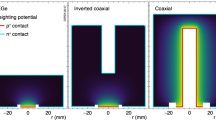Abstract
Achieving a percentage-level precision measurement of the coherent elastic neutrino nucleus scattering (CE\(\nu\)NS) spectrum requires a robust data processing pipeline which can be characterised with great precision. To fulfil this goal, we present hereafter a new Python-based data processing pipeline specifically designed for temporal data analysis and pulse amplitude estimation. This pipeline features a data generator allowing to accurately simulate the expected data stream from the Ricochet experiment at the Institut Laue Langevin nuclear reactor, including both background and CE\(\nu\)NS signals. This data generator is pivotal to fully understand and characterise the data processing overall efficiency, its reconstruction biases, and to properly optimise its configuration parameters. We show that thanks to this optimised data processing pipeline, the CryoCube detector array will be able to achieve a 70 eV energy threshold combined with electronic/nuclear recoil discrimination down to \(\sim\)100 eV, hence fulfilling the Ricochet targeted performance.






Similar content being viewed by others
Data Availability
The datasets generated during and/or analysed during the current study are available from the corresponding author on reasonable request.
References
S. Hertel et al. Ricochet progress and status, J. Low Temp. Phys. (This Special Issue) (2021)
T. Salagnac et al. Optimization and performance of the CryoCube detector for the future Ricochet low-energy neutrino experiment, J. Low Temp. Phys. (This Special Issue) (2021)
A. Juillard, others, Low-noise HEMTs for coherent elastic neutrino scattering and low-mass dark matter cryogenic semiconductor detectors. J. Low Temp. Phys 199(3–4), 798–806 (2019)
J. Lindhard et al., Influence of crystal lattice on motion of energetic charged particles. Kongel. Dan. Vidensk. Selsk. Mat. Fys. Med. 34(14), 965 (1965)
J. Billard, Searching for Dark Matter and New Physics in the Neutrino Sector with Cryogenic detectors. Habilitation à diriger des recherches, Université Claude Bernard Lyon 1, January (2021)
E. Armengaud et al., Performance of the EDELWEISS-III experiment for direct dark matter searches. J. Instrument. 12(08), P08010–P08010 (2017)
R. Voss, J. Clarke, 1/f noise in music: music from 1/f noise, J. Acoust. Soc. Am. 63, 258–263 (1978)
F. Alted et al., MRC Centre for Genomics and Global Health. https://github.com/zarr-developers/zarr-python
S. Di Domizio, F. Orio, M. Vignati, JINST 6, P02007 (2011). https://doi.org/10.1088/1748-0221/6/02/P02007
H. Lattaud et al., Phonon and charge signals from IR and X excitation in the SELENDIS Ge cryogenic detector, J. Low Temp. Phys. (This Special Issue) (2021)
J. Colas et al., Improvement of contact-less KID design using multilayered Al/Ti material for resonator, J. Low Temp. Phys. (This Special Issue) (2021)
Acknowledgements
This work is supported by the European Research Council (ERC) under the European Union’s Horizon 2020 research and innovation program under Grant Agreement ERC-StG-CENNS 803079. We are grateful to J.-B. Filippini and H. Lattaud for their feedbacks on the use of this processing pipeline.
Author information
Authors and Affiliations
Consortia
Corresponding author
Additional information
Publisher's Note
Springer Nature remains neutral with regard to jurisdictional claims in published maps and institutional affiliations.
Rights and permissions
Springer Nature or its licensor (e.g. a society or other partner) holds exclusive rights to this article under a publishing agreement with the author(s) or other rightsholder(s); author self-archiving of the accepted manuscript version of this article is solely governed by the terms of such publishing agreement and applicable law.
About this article
Cite this article
Colas, J., Billard, J., Ferriol, S. et al. Development of Data Processing and Analysis Pipeline for the Ricochet Experiment. J Low Temp Phys 211, 310–319 (2023). https://doi.org/10.1007/s10909-022-02907-5
Received:
Accepted:
Published:
Issue Date:
DOI: https://doi.org/10.1007/s10909-022-02907-5




